BGS Sing and Swing
On Sunday 16 October, the BGS multi-purpose courts were transformed into a jazz venue for Brisbane Grammar School’s Sing & Swing concert. The audience was delighted as choral and jazz band ensembles entertained the audience with hits like Come Fly with Me, Not While I’m Around, and The Longest Time. The Grammar Singers gave a sublime performance of the classic, Girl from Ipanema, by Brazilian jazz legend, Antonio Carlos Jobim, internationally recognised as the ‘Father of Bossa Nova’. This was followed by You’d Be So Nice To Come Home To, an upbeat swing number by the musical genius, Cole Porter. As ensembles clicked and grooved through their songs, the audience relaxed and took in the ambient atmosphere throughout the evening. Congratulations to the Grammar Singers for their enjoyable performance!

Grammar Singers entertaining the audience at the BGS Sing and Swing concert
Guitar Ensemble performance
The Annie Mackay room came alive with beautiful plucking and strumming from our wonderful Guitar Ensemble on Monday this week. They performed four pieces—Firefly Sky by Lennie Niehaus, Going Cuckoo by Andrew Forrest, Alleluia by WA Mozart arranged by Phillip Hayes and Ian Weston, and Tango Argentine by Gerard Montreuil arr. Angelina Ellis.
It was the final performance for Year 12 musician, Elodie Anthony (12G), who has been in the guitar ensemble since her earliest years at BGGS. Well done to the students and their director, Mr Weston, for a delightful performance.
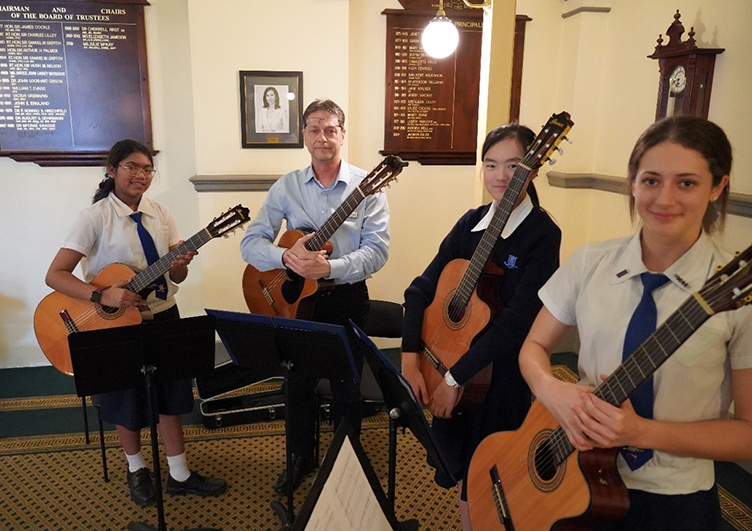
Talitha Thokala (8H), Mr Weston, Yolanda Huang (8O) and Elodie Anthony (12G)
Guitar and Bass Guitar Lessons at BGGS
Have you ever wondered what it would be like to play guitar? Do you already play guitar and would like to receive lessons at School? There are currently a few lesson times available for private guitar and bass guitar lessons at BGGS. Our teacher of guitar, Mr Weston, specialises in tailored and fun one-on-one private lessons, with a commitment to helping you achieve your best results. You will receive personalised lessons based on your musical interests, goals, and current level of ability. Mr Weston has extensive experience teaching and performing most styles of acoustic and electric guitar and bass. If you would like more information, please contact Mrs Harper in the Instrumental Music Department office in the CLC Building. The enrolment form can be found here.
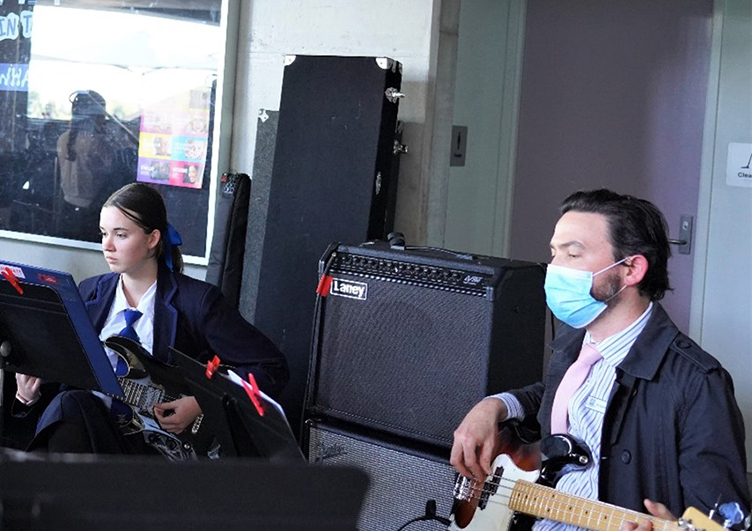
Sarah Beckingsale (11L) and Mr Jacob Cavanough playing the Guitar and Bass Guitar
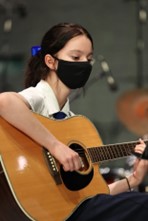
Sofia Cirino (12O) playing the acoustic Guitar
MSG News
The Spring Band and String concerts are approaching on 31 October and 8 November respectively. Please consider volunteering some time if your daughter is involved in these concerts—there are a large number of girls to cater for at the BBQ, as well as a parent bar before each concert. MSG committee members will be on hand to assist. To sign up, please visit the appropriate link:
Band—https://volunteersignup.org/WR4FP
Strings—https://volunteersignup.org/C7DPH
Our AGM is approaching on 10 November, and we are looking for a few more people to join our committee for 2023. Being on the MSG committee is a great way for parents to get involved with the Music Department, as we work closely with staff to assist them in whatever way we can. Your commitment will be two meetings per term, along with representing the MSG at events when you are able to. While most of our committee is continuing next year, we are specifically seeking a Treasurer. This role is not an onerous one, as our accounts are managed by the School. If you are interested in any MSG role, please contact us via email at msgbggs@gmail.com.
As we will be providing wine and cheese at the AGM, please register your attendance via this link.
Talent search
We are looking for talented students who may have an interest in playing or finding out more about, one of the more important and rare instruments. We are specifically looking for students who may be interested in discovering more about the tuba, double bass, viola, or euphonium. Maybe you are currently playing another instrument and want to accelerate your way through our ensemble structure by playing one of these rarer instruments. Perhaps you’re a Trumpet player with braces and would like a similar instrument that is less taxing on the embouchure. Or maybe you just want to be like the cool kids and play an instrument that few others can.
Whatever your reasoning, we would love to meet you to talk through it all. Please see Ms Porter, Mr Zorzetto, or Mr Johnston to find out more.
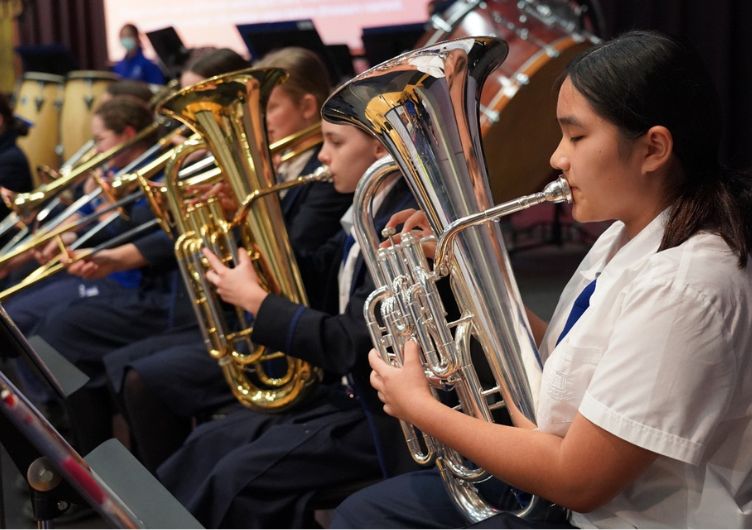
Jessica Allinson (7B) performing on the Euphonium
From the teaching studio
On Monday, we decided to visit one of our specialist teacher’s lessons, Ms Nicole Tait. Ms Tait is our teacher of bassoon at BGGS, and we took some time in her lesson with Amelia Barber (7B) to discover some of the intricacies of this wonderful and unique instrument.
The bassoon is a hauntingly beautiful instrument—what is it that drew you to want to play this rare but important instrument in the Band program at BGGS?
Amelia—‘When the announcement came out for needing people to join bassoon, I was really excited because it was recommended to Clarinet and Flute players, and I play Clarinet so I wanted to try it as I thought it would be fun to give it a try and now I love it’.
As you know, Ms Tait is the Section Principal Bassoonist with the Queensland Symphony Orchestra (QSO). What is one of the more interesting things that Ms Tait has let you know about playing the bassoon?
Amelia—‘The name for bassoon in Italian is Fagotto, which means a bundle of sticks. The length of a bassoon is deceiving because it is folded over at the bottom, making it appear just over a metre long’.
What role/s do you feel the bassoon has when performing in a Wind Band?
Amelia—‘I feel like the bassoon is a small part of the band and a big instrument, but is extremely important as a bass instrument. I may not get the melody a lot, but we need harmonies and bass parts as well, otherwise, it would just get boring’.
As Section Principal Bassoonist with the QSO, Ms Tait is uniquely positioned to provide a considered opinion on how the bassoon fits into a larger ensemble and the philosophy behind teaching the instrument in a secondary school setting such as at BGGS.
You have managed to attract a number of young students to study the bassoon at BGGS, what do you see as being of fundamental importance to the young Bassoonist when they commence studying the instrument?
Ms Tait—‘You don’t need to know how to read music when you start playing the bassoon, or any instrument for that matter. All you need is a curious mind and an interest in music. At BGGS, learning the bassoon opens many opportunities to join a band, orchestra, or ensemble.
Bassoonists, unfortunately, are a rare breed of instrumentalists—there are fewer of us compared to clarinetists and flautists, for example. We always need more bassoonists! The other fun part about playing the bassoon is the group lessons. So, if you have a friend who might like to form a bassoon group, it’s the perfect way to share the learning experience and play music together’.
Can you tell us an unusual or interesting fact about the bassoon?
Ms Tait—‘In the Renaissance period, the bassoon didn’t exist as we know it today. It evolved from an instrument called the Dulcian, which was one piece of wood. Interestingly, the Dulcian came in a range of sizes, from the small sopranos to the large bass dulcians. This has been replicated today in the modern bassoon with the development of the mini-bassoon. Mini-bassoons are great instruments to start on, especially if you are a younger and/or smaller student. I own two mini-bassoons and I love teaching them because they are so little’.
In your experience, what do you find young musicians enjoy most about playing the bassoon?
Ms Tait—‘From my experience, my students enjoy overcoming the challenges that the bassoon presents and then converting that into music. It is wonderful to watch them jump these hurdles each week and see them grow and improve as a musician. My students also love playing duets or trios either with me or among themselves. It is a very satisfying thing to do musically and is super fun. Sharing the joy with your friends’.
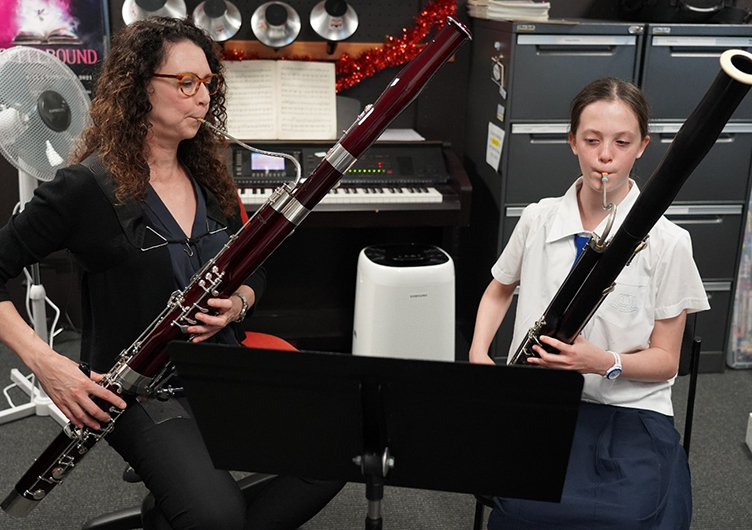
Ms Nicole Tait playing alongside Amelia Barber (7B) in their Bassoon lesson
Balancing the joy and challenge of making music
It is one of the apparent contradictions in the study of music, that it is both joyful and challenging. One could argue that you can’t have one without the other. Does the study of music bring joy because it’s challenging? Perhaps, for some, that is one of the reasons. Would the study of music bring joy if it wasn’t challenging? Again, for some, absolutely. Some young musicians are happy to sing or play away to a popular or easy song, simply because they like the melody.
This is an important balance to strike when contemplating what or how to study in the field of music—even at the secondary school level. If we limit our interests to what we already know or feel comfortable doing, might we be missing out on the possibility of being introduced to a deeper passion of which we aren’t yet aware?
In Instrumental Music, we consistently see students’ eyes light up when they discover something that grabs their focus for the first time. It might be a new instrument, a different style of music, a new ensemble, etc. Sometimes, students accidentally find their place in the music world on their own, and sometimes students can be led there. Recognising talents and abilities in particular fields, and on particular instruments, is a key element of the Instrumental Music Program here at BGGS. We strive to pair students with what they love or could love, to do.
For some of our students, what brings them joy in music is successfully performing a very difficult work that few have managed before them. For others, the joy they extract from performing music is the audience’s appreciation and admiration. Some may enjoy a particular style of music. Another may find a love of composing or arranging for a particular ensemble. Many students enjoy making music with friends who are in the same ensemble. Whatever the case may be for each student, there will be challenges, and persevering and overcoming those challenges brings its own sense of achievement, pride, and, indeed, joy. Whatever the challenge may be, the joy extracted is usually worth the effort.
Occasionally, a student will immediately fall into what they are driven to do. Others may grow towards that desire and push themselves to achieve higher standards. Thinking deeply about what our motivation in studying music is may illuminate the path we take. Whatever the case may be for each student, the BGGS Instrumental Music Program has a place and a pathway for them.
Mr Paul Johnston
Assistant Director of Instrumental Music
Looking Ahead
- New Year 7 Auditions—Friday 28 and Saturday 29 October
- Band Spring Concerts—Monday 31 October
- Band Performance Weeks (Auditions)—Week 5 and Week 6
- Strings Spring Concert—Tuesday 8 November
- Music Support Group AGM—Thursday 10 November




